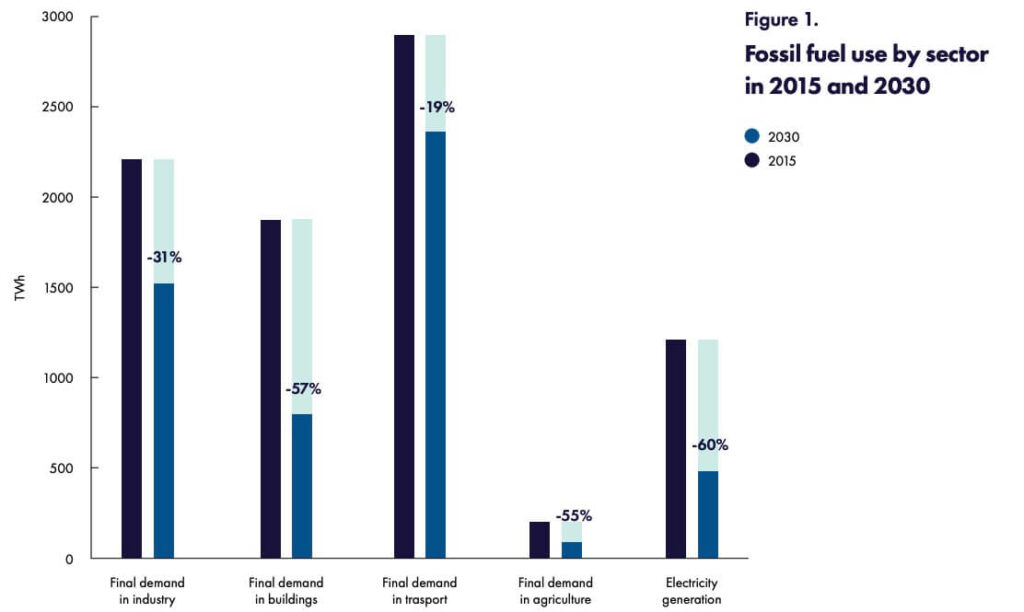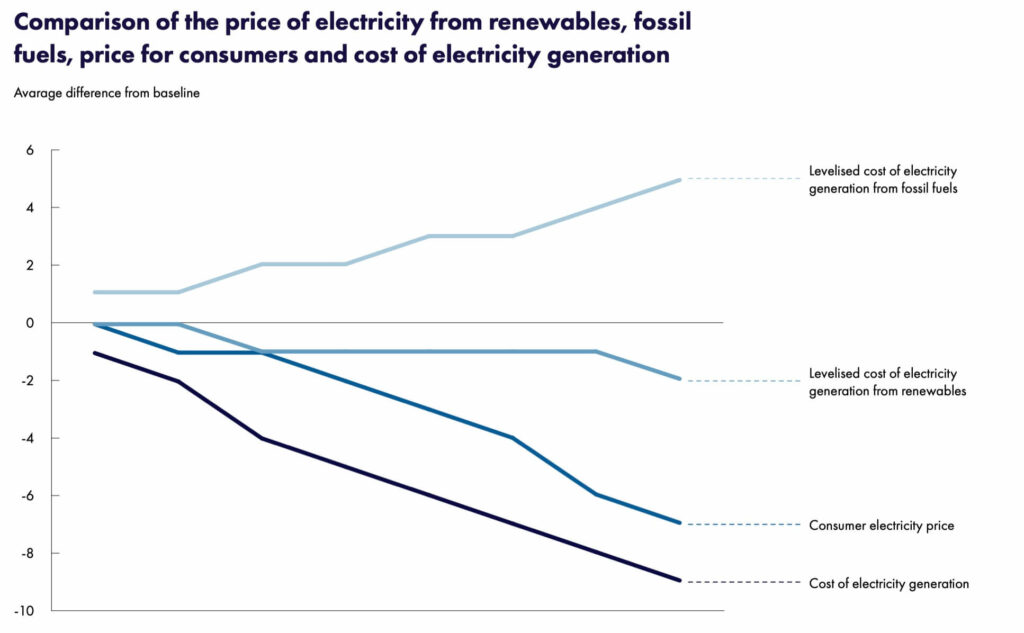16. 05. 2023
AUTHOR: Neil Makaroff
“Turning the European Green Deal into Reality” will bring security and benefits for businesses and households – report
With most of the laws adopted to implement the 2030 climate target, Strategic Perspectives takes stock of the European Green Deal. What began as a vision to make Europe the first continent to achieve climate neutrality by 2050 has not only evolved into the world’s most comprehensive set of laws to decarbonise the economy. The Green Deal will provide a range of benefits for businesses and households alike and put Europe on an irreversible energy transition path. Informed by Cambridge Econometrics data, this report analyses the concrete implications and benefits of the laws (‘Fit for 55’ package and ‘REPowerEU’ legislation).
Towards greater energy security based on the energy transition
The report finds that in just seven years, Europe’s energy landscape will be transformed if European climate laws are properly implemented. By 2030, 55% of electricity will come from wind and solar power, 29 million private electric cars will be on Europe’s roads and 58 million heat pumps will be installed. The high use of renewable energies, combined with energy savings and the electrification of transport, heating, and industry, will reduce gas consumption by 31% and oil consumption by 34% in 2030 compared to 2019. In terms of absolute gas demand, it will fall by between 83.50 billion cubic metres (bcm) in a low energy price scenario and 92.91 bcm in a high energy price scenario by 2030, almost equivalent to Germany’s gas consumption (94 bcm) in 2021. Coal is expected to be phased out by 2030, as it won’t be cost-competitive anymore according to the model findings.
Given the envisaged cut in gas consumption, the recent rush to build new gas and oil infrastructure, especially liquefied natural gas (LNG) terminals, is questionable. Energy savings and renewable energy deployment are the best ways to quickly decouple Europe from Russian energy. After decades of heavy and costly dependence on international fossil fuel markets, the European Union will begin to build a new energy security policy architecture based on the full potential of energy transition. It is a cost-effective and strategic choice for Europe.

The change is happening at an unprecedented speed and scale. Market forecasts from renewable energy associations show that the current rate of deployment will allow Europe to meet its renewable energy targets. Similarly, the installation rate of heat pumps in 2022 was at a record high, giving confidence that the deployment rate based on the laws is achievable. With additional support schemes, it can be properly implemented by EU countries and businesses.
Employment in renewable energies, building renovation and clean technology manufacturing is expected to grow the most, creating at least net 475,000 jobs in just a few years.
A competitive advantage for businesses and a lowering the impact of the cost of living crisis for households
Gas, coal and oil prices are a driving force behind high inflation in Europe. Rapidly replacing them with energy-saving and cheap renewables can provide a competitive advantage for European businesses and a safeguard against the cost-of-living crisis for households. According to our analysis, renewables will reduce average electricity prices for consumers by more than 7% compared to the business-as-usual scenario.

While Europeans are affected by the energy and the cost of living crisis, the European Green Deal offers solutions to reduce energy bills and stabilise inflation. Electric vehicles, heating system alterations to heat pumps, renewable electricity or renovating homes have the potential to protect Europeans’ wallets. The analysis shows that average household expenditure on electricity, gas and other fuels will fall from 8.6% of their total budget in 2022 to 6.1% in 2030, due to the high penetration of fossil-free solutions. However, this gain will not necessarily be distributed fairly across society. If climate-friendly solutions remain too expensive for low- and middle-class households, their energy bills and expenditure will remain high. Making the transition more affordable for them first should be a priority of national governments in implementing the Green Deal.
Implementation of the European Green Deal can guarantee a more sovereign and fair Europe
To secure the pace and the scale of the net-zero transition required by the European laws, Strategic Perspectives highlights three main challenges that need to be addressed:
- Unlocking investment and ensuring European solidarity. Additional investment of €351 billion by 2030 (excluding inter alia household spending on vehicles or efficiency) are needed for implementation compared to a business-as-usual scenario. This is equivalent to 10% of total investments made across EU countries in 2022. Given the constraints on fiscal space by some countries, a new European climate investment framework can enable sufficient access to funding across the EU. The debates on a European Sovereignty Fund and the review of the EU budget can take into consideration measures to ensure fair and sufficient support for all EU countries.
- Making climate-friendly equipment affordable for low and middle-income households as the basis of a new social contract in Europe. The upfront investment to access climate-friendly solutions is high for the average citizen. EU and national policy-makers can ensure equal access to net-zero technologies by providing targeted support to those who need it most.
- Building a European net-zero industrial base. Accelerating Europe’s transition can increase European imports in sectors related to net-zero technologies slightly by 2030. Europe, therefore, risks remaining a net-importer and dependent on China. Building European manufacturing of these technologies can reverse this trend, secure the achievement of climate goals, maximise the benefits in terms of employment and innovation, and position the EU at the forefront of the global race.
The European Green Deal has proven to be a unifying solution to the multiple crises facing Europe, including economic recovery from the pandemic, climate change, high dependency on energy from Russia and competition on net-zero technologies from China and the US. National governments now have a key responsibility to ensure implementation, which is the only guarantee to maximise the benefits.
